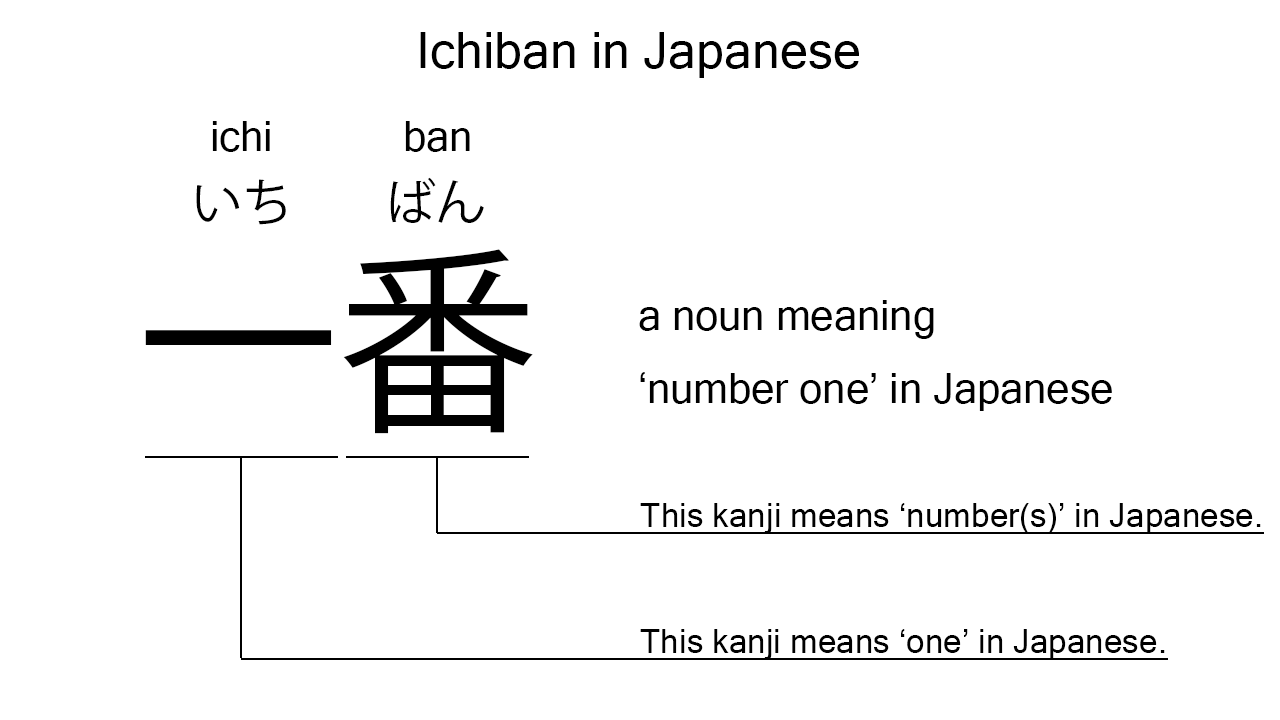What does “ichiban” mean in Japanese?
Native speakers use ichiban often to mean ‘number one’ in Japanese. Probably, many Japanese learners know this word as it is often used in Japanese shops, movies, songs, novels, manga, anime, and the like. In this blog post, however, I will explain this word in detail based on its kanji expression. And also, I will explain how to use it through example sentences. My explanations would help Japanese learners understand ichiban more clearly. Then, let’s get started!
Contents
Definitions and meanings of “ichiban”
Let me start with the definitions and meanings of ichiban.
- ichiban – 一番 (いちばん) : a noun meaning ‘number one’ in Japanese. This can also work as an adverb to mean ‘first’, ‘best’, or ‘most’ in Japanese.
Japanese native speakers use this word as a noun to refer to the first one or the best one in a group. In addition, they also use this as an adverb to add the meaning of ‘first’, ‘best’, or ‘most’ to the words used together.
The definitions and meanings are not that difficult, I think. To understand this word more clearly, however, let me explain its kanji characters in detail, one by one.
Ichiban in kanji
The kanji expression of ichiban consists of the following two kanji characters:
- 一 : a kanji character widely used as a numeral to mean ‘one’ in Japanese.
- 番 : a kanji character used to mean a ‘number’, ‘order’, ‘rank’, or such in Japanese.
From these two kanji characters, we can understand that ichiban literally means ‘one number’ in Japanese. Word orders in Japanese and English are different, but this literal interpretation is very close to the actual meanings, I think.

When we meet new kanji expressions, we should check their kanji characters in detail to understand their meanings clearly and deeply. In many cases, kanji characters tell us a lot about the meanings of the expressions they form. Actually, here, we could get the better understanding of ichiban through the detailed kanji check above.
So far, I’ve explained the definitions and meanings of ichiban together with its kanji characters. Then, let me explain how to use it through the example sentences below.
How to say “number one” in Japanese
boku ga sekai de ichiban desu – 僕が世界で一番です (ぼくがせかいでいちばんです)
I am the number one in the world.
Below are the new words used in the example sentence.
- boku – 僕 (ぼく) : a pronoun meaning ‘I’ in Japanese. This is used mainly by boys and young males.
- ga – が : a case particle used to make the subject word or the object word in a sentence. In the example, this is used after boku to make the subject in the sentence.
- sekai – 世界 (せかい) : a noun meaning ‘the world’ in Japanese.
- de – で : a case particle used to say where someone does something. In the example, this is used after sekai to indicate the group in which the speaker is the number one.
- desu – です : an auxiliary verb used after a noun or adjective to make it polite. Probably, this is well known as a part of Japanese desu form. In the example, this is used after ichiban to make it sound polite.
This is a typical usage of ichiban. In this example, it works as a noun to mean ‘the number one’ in Japanese. When we want to mean ‘the number one’ in Japanese, this noun is a very good option.
Another example of “ichiban”
kare wa ichiban utsukushii hito desu – 彼は一番美しい人です (かれはいちばんうつくしいひとです)
He is the most beautiful person.
Below are the new words used in the example sentence.
- kare – 彼 (かれ) : a pronoun meaning ‘he’ in Japanese.
- wa – は : a binding particle working as a case marker or topic marker. In the example, this works after kare to make the subject in the sentence.
- utsukushii – 美しい (うつくしい) : an i-adjective meaning ‘beautiful’ in Japanese.
- hito – 人 (ひと) : a noun meaning a ‘person’ in Japanese.
This is another example of ichiban. In this example, it works as an adverb to add the meaning of ‘most’ to the following i-adjective, utsukushii. This type of ichiban works normally in front of a word to add the meaning of ‘first’, ‘best’, or ‘most’ to it.
Summary
In this blog post, I’ve explained the definitions and meanings of ichiban in detail based on its kanji expression. And also, I’ve explained how to use it through the example sentences. Let me summarize them as follows.
- ichiban – 一番 (いちばん) : a noun meaning ‘number one’ in Japanese. This can also work as an adverb to mean ‘first’, ‘best’, or ‘most’ in Japanese. These two kanji characters literally mean ‘one number’ in Japanese. Word orders in Japanese and English are different, but this literal interpretation is very close to the actual meanings, I think.
Hope my explanations are understandable and helpful for Japanese learners.
Leave a Reply